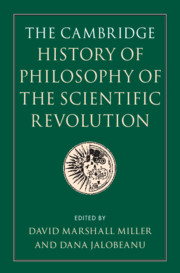Book contents
- The Cambridge History of Philosophy of the Scientific Revolution
- The Cambridge History of Philosophy of the Scientific Revolution
- Copyright page
- Contents
- Tables and Figures
- Contributors
- Preface
- Introduction The Disciplinary Revolutions of Early Modern Philosophy and Science
- Part I The Disciplines
- Part II Disciplinary Activities
- Part III Problems and Controversies
- 17 Galileo’s Sidereus Nuncius and Its Reception
- 18 Instruments and the Senses
- 19 Science of Mind
- 20 Circulation and the New Physiology
- 21 From Metaphysical Principles to Dynamical Laws
- 22 The Debate About Body and Extension
- 23 Space and Its Relationship to God
- 24 The Vis Viva Controversy
- Bibliography
- Index
19 - Science of Mind
from Part III - Problems and Controversies
Published online by Cambridge University Press: 14 January 2022
- The Cambridge History of Philosophy of the Scientific Revolution
- The Cambridge History of Philosophy of the Scientific Revolution
- Copyright page
- Contents
- Tables and Figures
- Contributors
- Preface
- Introduction The Disciplinary Revolutions of Early Modern Philosophy and Science
- Part I The Disciplines
- Part II Disciplinary Activities
- Part III Problems and Controversies
- 17 Galileo’s Sidereus Nuncius and Its Reception
- 18 Instruments and the Senses
- 19 Science of Mind
- 20 Circulation and the New Physiology
- 21 From Metaphysical Principles to Dynamical Laws
- 22 The Debate About Body and Extension
- 23 Space and Its Relationship to God
- 24 The Vis Viva Controversy
- Bibliography
- Index
Summary
This chapter concerns the early modern redefinition of psychology as the science of mind. It examines the way the “invention of mind” was incorporated into Descartes’s metaphysical project. This Cartesian innovation marked a rupture from the traditional science of the soul as a division of natural science or physics. Rejecting the Aristotelian partition of the soul into distinct powers and the Scholastic view of the principle of thought (the intellect) as only the highest psychic power, the new Cartesian psychology required the unity of the soul as the thinking substance. What constituted early modern psychology as a metaphysical science of mind, this chapter argues, was fundamentally Descartes’s “realist” thesis that mind is a thing (res). Together with this Cartesian substantialist view, its critical reception structured the modern science of mind. The early modern alternatives to Descartes’s ontological thesis about mind, the chapter highlights, were based either on the argument that mind is not a thing or on the argument that mind is a non-substantial thing, a mere mode. The chapter illustrates the first argument with Hobbes, the second with Regius and Spinoza.
Keywords
- Type
- Chapter
- Information
- The Cambridge History of Philosophy of the Scientific Revolution , pp. 350 - 368Publisher: Cambridge University PressPrint publication year: 2022

